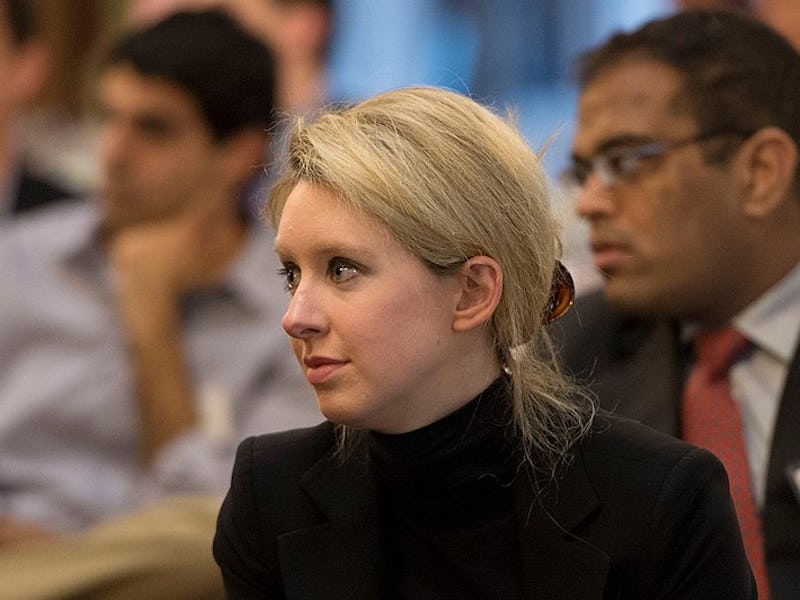Elizabeth Holmes Exemplifies Our Evolutionary Need to Hate Posers
"If we all agree you are terrible, then you are by social definition terrible."

Elizabeth Holmes is considered to be, by the court of public opinion and possibly by the US District Court in San Jose, a poser. The latter is concerned with her legal fraudulence, while the former is fascinated by her manipulation of social expectations. Yes, Holmes lied about what her company, Theranos, could do, subsequently amassed billions of dollars, and allegedly schemed to defraud doctors and patients. But Holmes also dyes her hair, seemingly speaks with a put-on baritone voice, and subverted the expectations of a TIME 100 icon.
The HBO documentary The Inventor spurred intensified enthrallment with Holmes, creating a market for speculation over why she would opt to have bad blonde hair, why she would change her voice, and whether or not she’s a sociopath. Parodies of Holmes have gone viral; CNBC reports she’s “a master of deception.” Holmes is, per Refinery 29, “a string of clichés fed into a machine and spit back out by a robot in a black blazer” (and turtleneck). And for that, the collective has decided she must pay the consequences.
Humans have evolved to be particularly antagonistic toward posers, John Tooby, Ph.D., tells Inverse. Tooby is an anthropologist and one of the pioneers of evolutionary psychology.
“Posers, in general, are irritating,” Tooby says, “because they are attempting to gain status fraudulently, and it feels right to puncture their pretentions and poses, because the status they are designed to accrue comes at other people’s expense.”
Elizabeth Holmes could possibly face 20 years in prison.
Holmes, he observes, “is overdetermined as a target of pile-on mob-sourced hostility.” She’s attractive, young, and once widely admired and successful. She’s also a moral violator. These factors sound alarms rooted in our brains particularly attuned to hating deception and the chance to accrue personal power.
It’s believed that humans evolved to be especially sensitive in regard to cheaters. It sort of comes from a nice place: Humans evolved to be cooperative, kind, and compassionate in order to create group alliances that spur benefits for all. We’re considered extreme outliers in how much cooperation we generate and depend on. However, Tooby explains, because we evolved to be so cooperative, that paradoxically opens us up to exploitation by deception.
“If no one expected to cooperate with Elizabeth Holmes and Theranos, no one could have been ripped off, because no one would have invested,” he points out.
So while humans take part in these positive-sum behaviors, we also indulge in zero-sum interactions — moments where we take and exclude others from desirable resources. Because of this, we coevolved mental adaptions for cooperation paired with adaptations for detecting cheaters, free-riders, and exploiters. This, Tooby says, “sets up a coevolutionary race to get better at deception.”
When a person’s social world was 60 ancient humans, it was easier to use our evolutionary-wrought toolset and figure out who was deceiving us to get ahead. Now that we live in mass societies, it’s harder. This is especially true when the cheaters fake exceptionally good nonverbal cues to trustworthiness and affection, something cheaters demonstrably do.
When asked how it felt to be a billionaire, Holmes — who went from Forbes’ “richest self-made women” list to Fortune’s list of “most disappointing leaders” — made herself a convincing case of someone who wasn’t about to persuade sick people to use a faulty product.
“It’s not what matters,” Holmes told CBS in 2015 about her wealth (watch it above). “What matters is how well we do in making people’s lives better. That’s why I’m doing this.”
Our dislike for cheaters and our instinct in making their deception known pairs easily with another evolved trait: The tendency to join a crowd in the takedown of a poser. We all have a need for status — and, in turn, eliminated others as rivals — but these motivations are generally turned off or submerged because it’s a losing strategy to attack everyone all the time.
But, Tooby explains, if someone is flagged as distinctive for some reason, then that makes them a tempting target for others to implicitly strategize against.
“The psychological gain is even greater if it is someone who ranks higher than you on implicit status hierarchies — you have moved up if those who are more ‘elevated’ than you fall — and falling can be facilitated through social collaboration,” Tooby says. “If we all agree you are terrible, then you are by social definition terrible.”
We’re in an even better place to take someone down if we can use moral justifications. Tavi Gevinson is considered a feminist icon; she’s also comfortable doing a crazed parody of Holmes, who was once also seen as a feminist icon. These two things can exist in the same space without much retribution because society has decided Holmes is a bad person.
Sydney Levine, a postdoctoral researcher at MIT, studies how moral learning works.
Levine tells Inverse that we can think of this moral mob through the lens of philosopher Immanuel Kant, who once argued that you could figure out if any action was right or wrong by asking, What if everyone did that?
"We use the tools of public shaming as a form of punishment."
“It may not make much of a difference for one person to pretend to be something she’s not, but if our whole society acted like that, things would entirely fall apart,” Levine says. “We use the tools of public shaming as a form of punishment to enforce moral norms that can’t be so well regulated by the law.”
What the law can regulate is any fraudulent scheme to intentionally deprive another person of finances, which Holmes is accused of. She’s set to attend a status hearing for the criminal case on April 22 in San Francisco. Holmes faces a maximum of 20 years of prison, but the hits to her reputation have already piled.